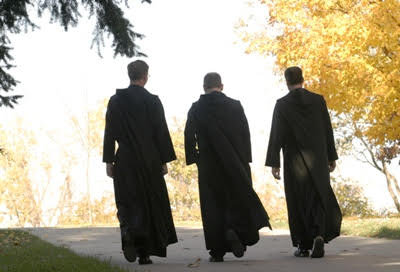In my own faltering way I have attempted to follow the Lord Jesus in the path of St Benedict, and one of the aspects of the Benedictine life from which I have profited most has been the Benedictine vows of Stability, Obedience and Conversion of Life. These vows differ from the Franciscan vows of obedience, poverty and chastity. The Benedictine would say that poverty and chastity are important dimensions of the religious life, but that they are, if you like, natural results of the pursuit of virtue and that stability and conversion of life more precisely go to the root of the spiritual life.
This has been impressed on me increasingly as I look back on my own life and on the present situation. The three Benedictine vows are intertwined, but obedience and stability of life are, perhaps, most deeply woven together. Instability is a killer for the spiritual life because it is invariably linked with the Frank Sinatra problem–the tendency to “Do It My Way”. As a convert to Catholicism I have, from time to time, had to endure the stone throwing of a few cradle Catholics who, disagreeing with something I’ve written, have said things like, “What religion will you follow next?” or “How can we trust a man who jumps from one denomination to another every few years?” I share their concern to a certain extent and usually reply with, “Well, I’ve never been a Methodist.”
So in the spiritual life we always have the temptation to up sticks and search for a new promised land–the parish that really does liturgy properly–the denomination that does not have a corrupt and immoral hierarchy or the religious group that suits out temperaments just right. This religious pick and choose leads to an instability that, given its head, will lead us down a rabbit hole of self determination, religious heresy and spiritual solitary confinement. The cure for this insidious disease is the strong medicine of obedience.
But obedience is tough. Its all well and good being obedient when what is expected is what we want anyway, but obedience is only really tested when we are expected to do what we don’t like. When the command is actually stupid, unjust or just plain absurd the obedience is even tougher, but what virtue is there in doing what is sensible and pleasing to our own will? This territory, however, is like a swamp riddle with spots of quicksand. Too often in religious life the vow of obedience is used as an instrument of abuse. A domineering superior imposes his or her will on vulnerable subjects, and to complicate matters further, there are some poor folks who like and even have a twisted psychological need to be dominated and the dominator and the dominated seem to be be drawn to one another in a disturbing way. Obedience therefore, must always be accepted and willed–never imposed by force.
Allow me a personal story: We left the Anglican Church in 1995 and for ten years, living in England and feeling called to the priesthood, I supported my family and waited for the church to say “Yes” to the call I had heard. Bishops took months to answer letters. Committees deliberated and delayed. All sorts of problems arose, including my own bishop who resolved not to ordain any former Anglican clergy. Friends suggested that I go shopping for a more congenial bishop. I refused because I felt I had to be obedient to my own bishop–even though I thought he was not only mistaken, but a clown. (humanly speaking of course) It was, at best, a halting, hesitant and reluctant obedience, but it was obedience nonetheless, and through that experience I have, I hope, learned something of the virtue of stability. It was obedience that forbad me to give the bishop a prayerful middle finger and set off on my own. That insistence on staying put and placing myself into the Lord’s hands contributed to the growth of stability.
I believe that stability cannot actually be learned without this grueling trial. Obedience proves and builds stability and forces us to put our trust in God alone.
The three vows are intertwined like a three braided rope so Obedience and Stability are therefore woven into the ultimate end of our quest which is conversion of life. This conversion is a conversion of the whole of our life and it is both the work of a moment and the work of a lifetime. Work which is God’s work in and through us–the action of divine and human co operation.
For more on the Benedictine way of life and wisdom you might want to check out my six week video course on The Way of St Benedict here.







“This religious pick and choose leads to an instability that, given its head, will lead us down a rabbit hole of self-determination, religious heresy, and spiritual solitary confinement. The cure for this insidious disease is the strong medicine of obedience.
But obedience is tough. It’s all well and good being obedient when what is expected is what we want anyway, but obedience is only really tested when we are expected to do what we don’t like.”
Well said. Reminds me of the cautionary tale of Archbishop Marcel Lefebvre and the SSPX’s backstory. A case of what taking matters into your own hands does, burnt bridges, toxic sectarianism, and breeding of sedevacantist mentalities/off-shoots (i.e., Donatism repackaged and reappearing as weeds).